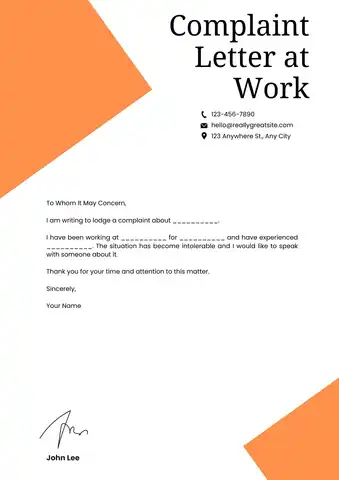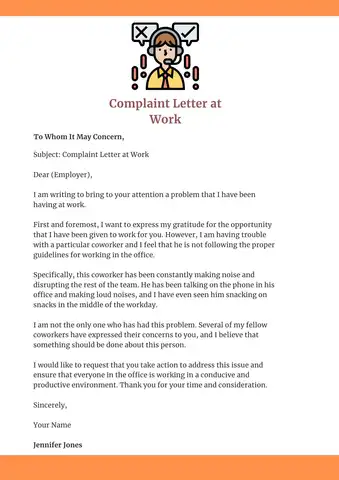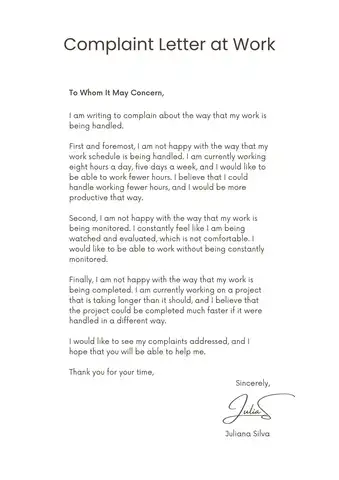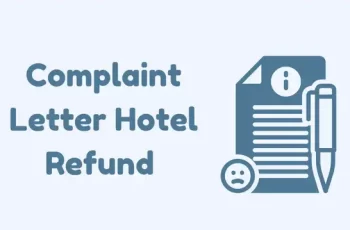A complaint letter at work is a letter that a worker sends to their employer expressing dissatisfaction with how they are being treated at work. This letter can be written in any format, but it is typically written in a formal, polite tone. The purpose of a complaint letter at work is to raise awareness of the worker’s concerns and to get the employer to take action to address the issue.
Table of Contents
How to Write a Complaint Letter at Work To Fix Problems At Work Quickly

Complaint Letter at Work
If you have problems with your work, feel free to write a complaint letter. This simple document can help you get your issues resolved more quickly. Here are 10 tips for writing a complaint letter at work that will help you get the most out of your experience at work.
Identify your issue.
If you have a problem with your work, the first step is identifying it. There are a few things you can do to help this process along. First, consider the issue in terms of how it relates to your job. Do you have trouble meeting deadlines? Is your work taking longer than it should? Are you struggling to understand what is expected of you? Once you understand the problem well, you can begin to investigate further.
If you are still trying to figure out where to start, consider speaking with your supervisor. They can help you understand your job more clearly and set expectations for you. If that does not work, you can also reach out to HR. They can assist with filing a formal complaint or resolving the situation independently.
Explain the issue.
If you are experiencing an issue with your work, it is important to explain what is wrong. Solving the problem without understanding can be frustrating and lead to more problems.
To best address your concerns, it is important to list all of the problems you are experiencing. This will give the person you are communicating with a better idea of what is wrong.
Next, it is important to explain why the problem exists. This is where you will need to be most specific.
Explain what specific task or action upset you and how it impacts your productivity.
Including a timeline of events that led up to the current situation can be helpful.
Finally, be as transparent as possible when requesting a resolution. Listing your requests will help ensure that the problem is fixed in the most efficient way possible.
If you are requesting retaliation against those, who have been disrespectful or have caused you stress, be sure to state these requests explicitly.
It is also helpful to explain why retaliation would be beneficial. For example, if someone is constantly making fun of you, stating that their behavior needs to stop would go a long way in changing their behavior.
When requesting changes or a resolution, be as specific as possible. State which task or action you would like changed and why it is causing issues for you.
Be sure to provide evidence, such as screenshots or logs from your computer. If the request is complex or time-consuming, let the person know this upfront and ask if they can expedite the process.
Read Also: 20+ Great Consumer Complaint Letter
Finally, requesting confidentiality for any discussions during this process is important. This includes conversations between you and the person you are speaking with about your issue.
It is also important to remind the person that any information they share may not be shared with others without your consent.
Request a resolution.
When you have a complaint issue at work, the first thing to do is identify it. Next, explain the issue as clearly as possible.
Request that the problem be resolved as soon as possible. If a resolution cannot be reached immediately, request that the problem be escalated to a supervisor or manager.
Request that any retaliation against you be avoided. Request confidentiality is maintained to protect your privacy. Finally, ask for a response to your letter to be sent as soon as possible.
Request retaliation is avoided.
Make sure that your complaints are based on facts. Always address the other person directly, and don’t try to argue the issue at hand on their behalf.
Let the situation cool off before requesting retaliation. Please speak to your supervisor or human resources if you feel you are being treated unfairly or experiencing retaliation.
Request confidentiality is maintained.
When you send a complaint letter at work, you should keep your identity and the details of your complaint confidential. This will help ensure that your issue is resolved quickly and without additional drama.
Do not share your complaint letter at work with anyone else, and do not speak to the person who caused the problem unless you have followed steps 1-5 of this guide. Thank you for keeping your complaint letter confidential.
Request a response be sent immediately.
When you write a complaint letter at work, your first step is identifying the issue. Frequently, issues arise from misunderstandings or miscommunications.
To ensure that your complaint is taken seriously and that a resolution can be quickly reached, identify the problem as clearly as possible.
Explain the issue. Once you have identified the problem, be sure to give a detailed explanation of what occurred. Include specifics about what was said or done that led to the issue and how it has negatively impacted your work. Include any supporting documentation if necessary.
Request a resolution. In your request for resolution, be sure to ask for what you believe is appropriate redress for the issue. This might include fixing the problem, apologizing, or reimbursing you for lost time.
Request retaliation is avoided. Sometimes people get retaliated against when they complain at work. Request that any retaliation is avoided to protect your rights. This includes anything from getting unfairly disciplined to being passed up for promotion.
Request confidentiality is maintained. Many times, people want their complaints to remain confidential. This is especially important if the issue involves someone else’s privacy. Ask that any information relating to the complaint be kept confidential unless otherwise agreed upon by both parties.
Request a response be sent immediately. Pathology can develop rapidly when problems are left unresolved. Request a response be sent as soon as possible so that you can resolve the situation and move on.
Request an apology be made.
When you make a mistake at work, it’s important to take the time to apologize to your employer.
Apologize for what you did, why it caused a problem, and how you’ll avoid making the same mistake again.
Promise not to discuss the issue with anyone outside of work, and ask your employer to do the same.
Cooperate fully with any corrective action, and express your willingness to learn from your mistake.
Making this formal apology will help restore trust between you and your employer and can reduce the chance of future conflict.
Request an acknowledgment be sent.
When writing a complaint letter at work, it is important to remember that you are requesting acknowledgment and not a response. Consider what an acknowledgment would look like and send it promptly. Here are a few guidelines to follow:
- Thank the person for taking the time to read your letter and respond.
- State when you anticipate receiving a response and thank them again for their efforts.
- Please reach out again if you don’t receive a response within a reasonable time. However, do not leave another voicemail or write another letter just because you didn’t receive a response to the first one.
- Do not take the lack of a response as a sign that your issue wasn’t important or worth addressing. The person who received your letter will often be able to tell you more about what happened based on the information in the letter itself.
- Remember that sometimes people may be busy and unable to respond immediately. Thank them for their consideration and patience while waiting for a response.
Request a meeting be scheduled.
Sometimes it can be difficult to resolve an issue without meeting in person. However, sometimes it is more convenient or achievable to do so through email or phone calls. For the request for a meeting to be successful, it is important to identify the issue and explain it in as much detail as possible.
When requesting a meeting, it is important to state your reasons for wanting one. For example, discuss what happened, what you think should have happened, or what you would like to see happen moving forward.
- If the other party denies your request for a meeting, offer another time for you to meet in person.
- If the other party cannot make the proposed time, suggest another communication method (such as email or telephone). However, be clear about which method(s) you prefer and ensure that everything is agreed upon before moving forward.
- If the other party agrees to meet but suggests a time that is not feasible or convenient for either party, propose another date or time for a meeting. However, again be clear about whether this time works for both of you and what documentation or screenshots you would like to have sent in advance.
- If the other party cannot agree to any reasonable times or dates for a meeting, then it may be best to try resolving the issue remotely. This can be done by exchanging messages or providing documentation and screenshots in advance so that both parties can fully understand the situation.
Request an explanation be sent.
Consider requesting an explanation when you raise a concern or issue with your supervisor. This request can help you clarify the company’s policy, understand why a situation occurred, and why something was done.
When making this request, it is important to be specific about what you need to know. Include the situation’s date, time, and specific details to better understand and resolve the issue. And be sure to follow up with your supervisor once you have received an explanation – it shows that you are committed to resolving the problem.
If you feel you have been mistreated at work, don’t hesitate to seek help. A complaint letter at work can help you resolve your issue quickly and efficiently. But remember: always be respectful and polite when contacting your supervisor – it will go a long way in improving your relationship.

Example of Complaint Letter at Work

Complaint Letter at Work Sample
conclusion
In conclusion, a complaint letter at work can be a very effective way to resolve your problems quickly and without retaliation. By following these tips, you can ensure that your letter is effective and deliver the message you want.

